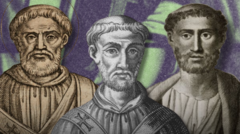How African popes shaped Christianity - and celebrated love
Historically significant, North Africa was not always predominantly Muslim; it once stood as a powerful Christian center, nurturing Catholic popes whose impacts are felt even today. The region, encompassing modern Tunisia, Algeria, and parts of Libya, was home to three remarkable popes—Victor I, Miltiades, and Gelasius I—who shaped Christian belief and practice during the Roman Empire.
Renowned historian Prof. Christopher Bellitto highlights North Africa’s biblical influence, stating, "It was the Bible Belt of ancient Christianity." As the Catholic Church contemplates a successor to Pope Francis, many within Africa are hopeful that the papacy might return to the continent after over 1,500 years. This article explores the legacies of these popes and their lasting influence on global Christian traditions, including Easter Sunday and St. Valentine's Day.
**Victor I** (189-199)
Pope Victor I, believed to have Berber roots, presided during a time of disturbing persecution against Christians for resisting Roman idol worship. One of his monumental achievements was establishing Easter’s observance on Sundays, marking a significant divergence from earlier practice when it aligned with the Jewish Passover, which varied across weeks. Victor called the first Roman Synod, leveraging excommunication to unify the Church on Easter's date. Additionally, he introduced Latin as the Church's liturgical language, transitioning from Ancient Greek, thereby influencing how Catholic liturgy evolved.
**Miltiades** (AD 311-314)
Born in Africa, Pope Miltiades led the Church during a time of growing acceptance under Roman Emperor Constantine. This era marked a turn for Christianity, previously marred by persecution. Although he benefitted from this newfound acceptance, Prof. Bellitto argues Miltiades was more a beneficiary than a negotiator of Christian rights. He became the first pope to have an official residence within a palace and oversaw the construction of the Lateran Basilica, dubbed "the mother of all churches," a historical symbol that persists in Catholic traditions.
**Gelasius I** (AD 492-496)
The most influential of the trio, Gelasius I, is often recognized as the first pope to be termed the "Vicar of Christ." He articulated the Doctrine of the Two Swords, establishing a balance of power between Church and state. This notion emphasized divine delegation of authority, positioning the Church above earthly rulers. His governance also included addressing the Acacian Schism by asserting Roman supremacy in Christendom, a pivotal moment in ecclesiastical history. Not to be overlooked, Gelasius is credited with formalizing St. Valentine's Day on February 14 to honor the martyr, integrating pagan festival traditions into Christian practices.
While vision and influence flowed from these African popes, no new representatives emerged from the region for over 1,500 years. Prof. Bellitto suggests that today's processes for papal succession evolved into an "Italian monopoly," sidelining candidates from Africa. However, the emerging demographic shifts in Catholicism—boasting 281 million adherents in Africa in 2023—hint at the possible resurrection of the papacy's African roots.
Currently, three candidates of African descent are poised for the papacy: democratic Republic of Congo’s Fridolin Ambongo Besungu, Ghana's Peter Kodwo Appiah Turkson, and Guinea's Robert Sarah. Experts like Prof. Philomena Mwaura stress that while Christianity thrives in Africa, the Church’s resources remain concentrated in the north. Yet, as African Catholicism strengthens and garners global attention, a scholarly consensus suggests that the next pope could very well be African.
In a world grappling with representation in religious leadership, the prospects for an African pope rekindle hope for a once-revered legacy, waiting to be realized anew.





















